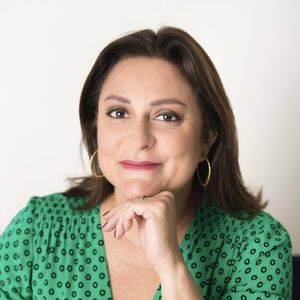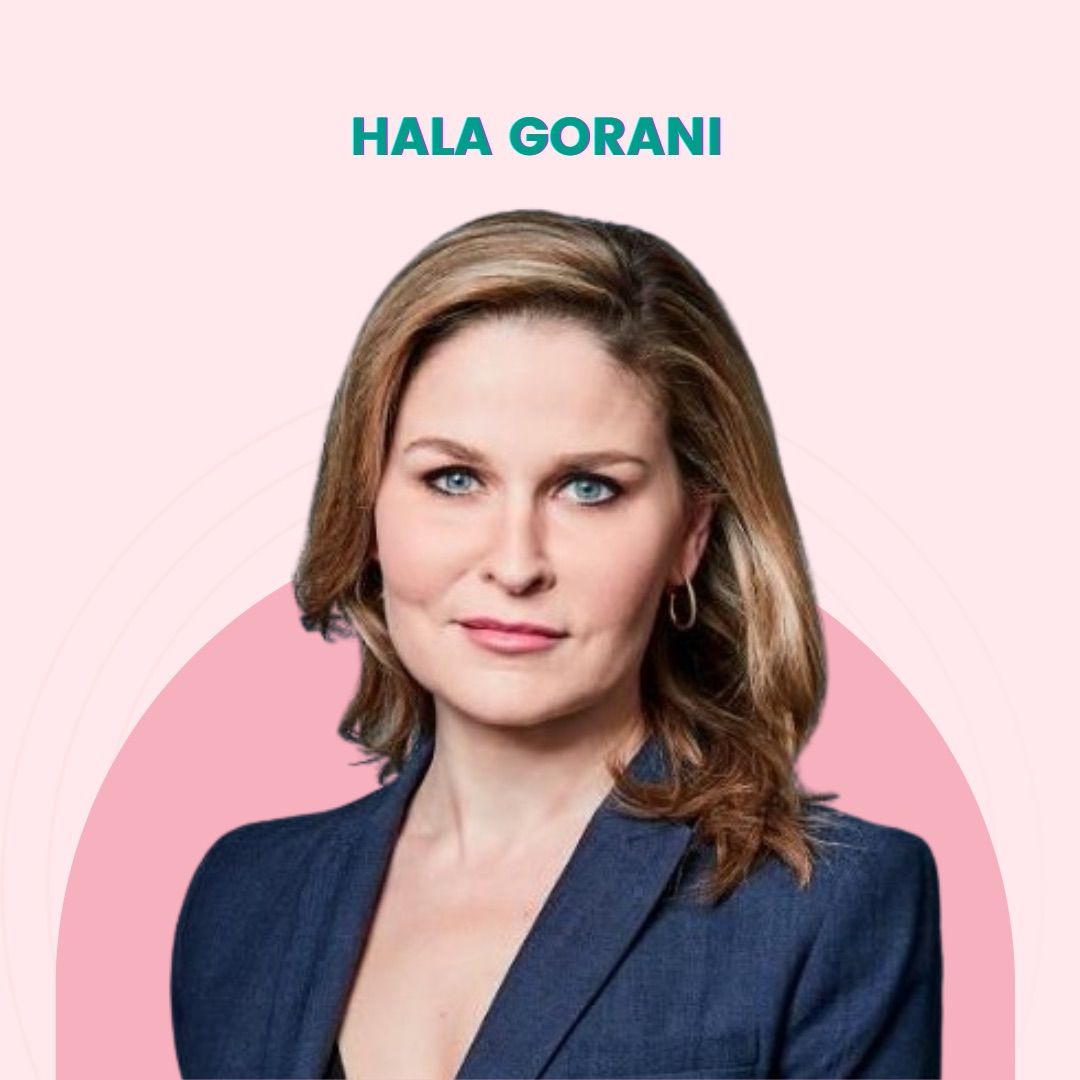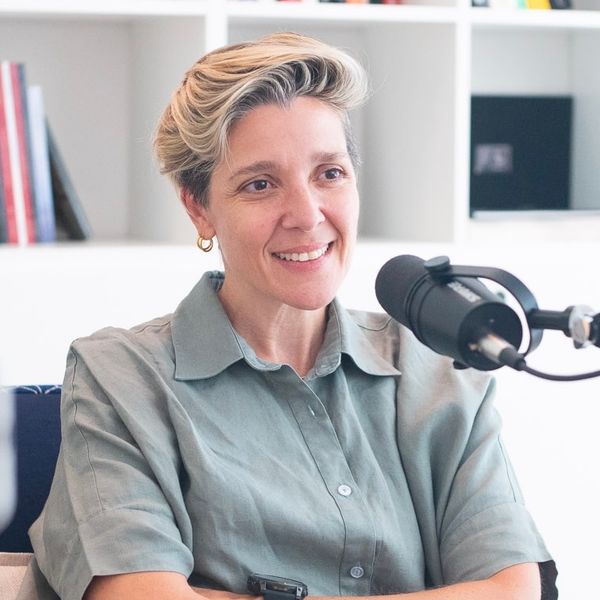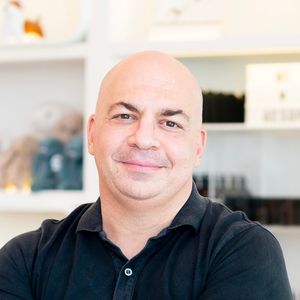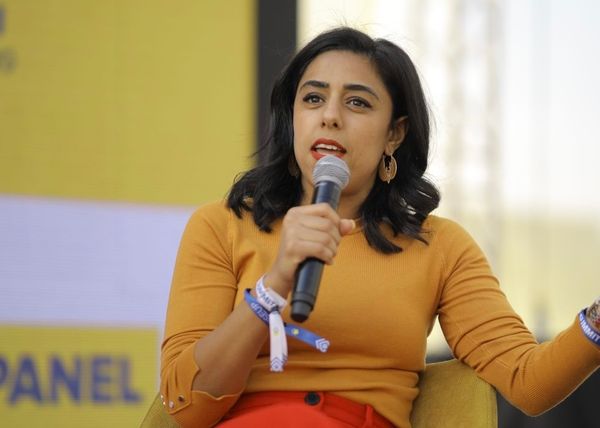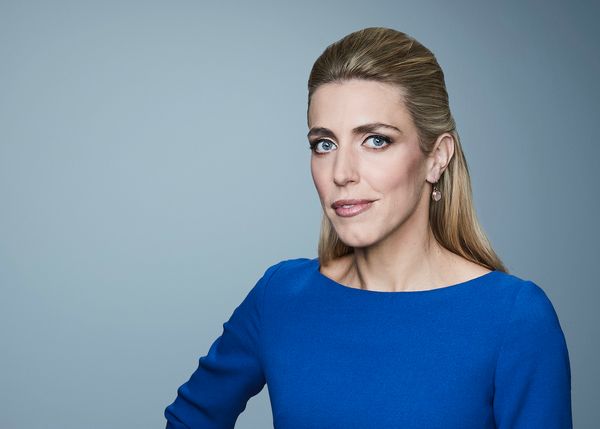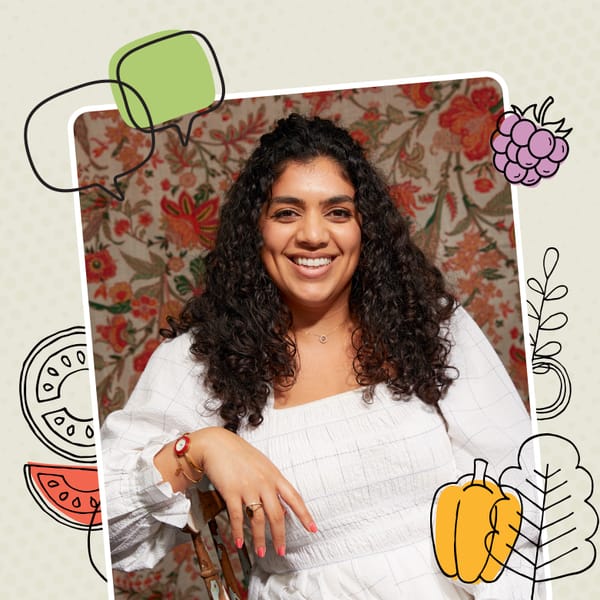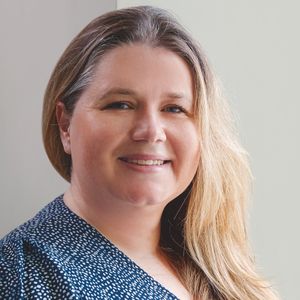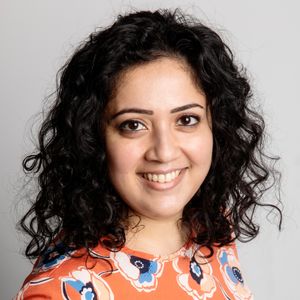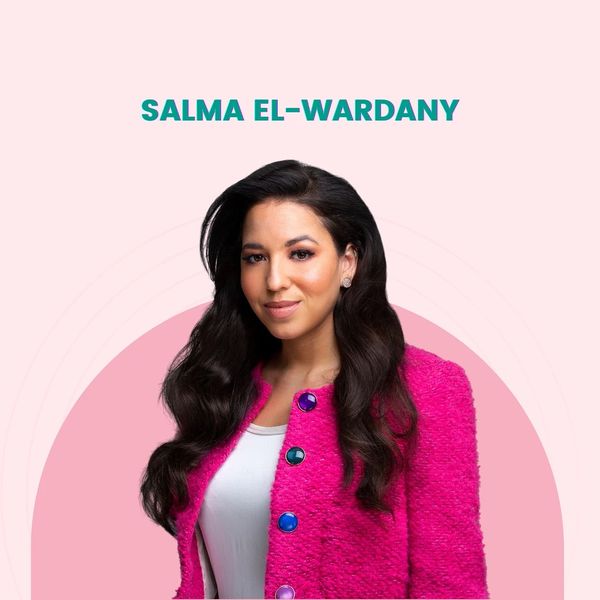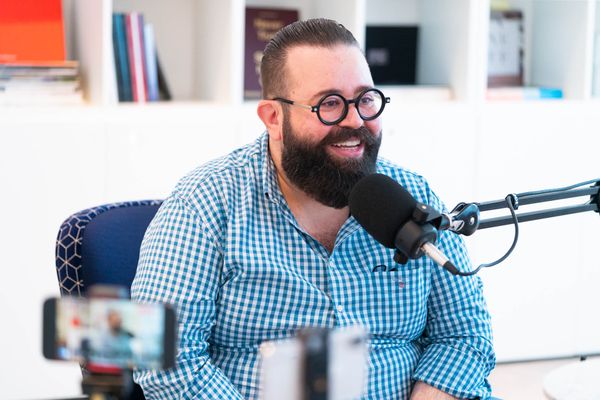Welcome to Season 5!
We're kicking off with a powerhouse broadcaster and journalist, Hala Gorani. Over a career spanning 25 years, Hala has covered natural disasters, wars, elections and interviewed key global leaders. Last year, Hala took a sabbatical from CNN and is currently working on her first book—a memoir that explores the subject of identity—which will be out in Spring 2024.
EFG Hermes One, your one-stop gateway to investment
We dig into her life’s pivotal moments, growing up in the US and France, how and why she chose to become a journalist, and how she’s working to better understand her multicultural identity in a increasingly complex world.
Links
- Vogue Arabia: Ex-CNN News Anchor Hala Gorani on Taking a Sabbatical Year, and Why the Risk Has Been More Than Worth It
Transcript
[00:00 - 00:23] Welcome to What I Did Next from A&T Media. I'm Malak Fouad, the show's host. This show delves into people's life journeys from the point of view of twists and turns, shifts and pivots. We've all had them. Some are more visible than others and make a stop in our tracks, take note and maybe make a course correction. Other changes along our
[00:23 - 00:47] path only come into focus with hindsight, when we look back and realize a particular moment in time was pivotal in our lives. These are the ideas that form the underlying current of What I Did Next. We kick off the season with a powerhouse broadcaster and journalist who until recently came into our living rooms most evenings to keep us informed about world events. I welcome Hala Gorani to the show. With over 25 years experience, Hala is an
[00:47 - 01:08] award-winning anchor and correspondent, most recently with CNN, where she anchored Hala Gorani Tonight. She has covered natural disasters, wars and elections over the years and has interviewed key global leaders. Today, Hala has taken a sabbatical from TV and is currently working on her first book, a memoir that explores the subject of identity, which will be published
[01:08 - 01:29] by Hachette Book Group in early spring 2024. We dig into her life's pivotal moments growing up in the US and France, how and why she chose to become a journalist and how she's working to better understand her multicultural identity in an increasingly complex world. Let's kick off our conversation with our trademark icebreakers and we've brought back an old favorite this
[01:29 - 01:50] season. If Hela could host a fantasy dinner party, who would be around her table? So I would have my maternal grandmother, Berine Gorani, who died in 2009. Part of the reason, obviously, is because I miss her and she was a wonderful, lovely, warm human being. The other thing is, it's a little bit late in life that I decided to think about my family
[01:50 - 02:14] history and so many of the questions that I have for my mom, my mom's generation, we're not necessarily able to answer, whereas she lived through those periods that I'm describing in a book that I'm writing and so I would love to have her. As far as famous people and historical figures, it's difficult because oftentimes when you meet people you admire,
[02:14 - 02:37] you're disappointed because you've just kind of magnified them in your mind and lionized them. But among those that I would love to meet in person and be able to have a chat and a bite with would be Janis Joplin because she died so young and I'd be very interested and I'm such a huge, huge admirer of how she covered songs, especially jazz classics in
[02:37 - 02:57] her own way, like Summertime, like Little Girl Blue, things like that. I think I'd love Freddie Mercury, but then I'm a little bit iffy about Freddie Mercury because he's my favorite male voice. I think to myself, if you meet Freddie Mercury and he happens to just kind of be in a bad mood that day, I don't want to know. I've met some of my favorite
[02:57 - 03:23] stars and they've not been great sometimes in person, not always, but sometimes, and then kind of the way I don't appreciate their art in the same way. I think then I'd just love to meet sort of the big prophets. I know this sounds crazy, but I just would like some of the cover. I'd like to be able to go back in time and ask some of the prophets of the
[03:23 - 03:47] main religions what their take is on the interpretation of some of the scriptures. It would be fascinating. So having a quote unquote dinner party, I don't know what we'd be eating or drinking, but at least an opportunity to converse. Depending on the religion, you'd have to change the menu. Over the course of the various seasons that we've had, the prophets have come up a lot.
[03:47 - 04:09] I think it's because so much that we know about them is not based on fact. A lot of it is mythology and people do have questions. I think it's a really interesting group of people. Definitely, I mean, Janis Joplin with the prophets I think would be hilarious, but that's another story. Yes, exactly. And Freddie Mercury.
[04:09 - 04:30] And Freddie Mercury, exactly. It is true. I don't know about you, but it is true sometimes that when we meet people we've seen only on screen or whose work we admire, you might not want to call it disappointment, but a readjustment necessarily happens because what you've built up in your mind is rarely exactly what they end up being like.
[04:30 - 04:56] That's right, for sure. Tell me, Hala, are you a cook? I mean, would you be worried about what's on the table? Would you be fussing about your table setting or did that not configure in your thinking? Were you just thinking of the personalities coming to the table? So I'm a Syrian, which people might assume means that I cook and care a lot about food
[04:56 - 05:18] because as you may know, and as people who know the Middle East, especially from Aleppo, by the way, but I really hate cooking and bad at it and don't care what I eat. So I'm one of these people who, I mean, I care in the sense that I like a sandwich and a burger or whatever, but like the most wasted money on earth would be money spent taking me to
[05:18 - 05:44] a Michelin star restaurant because for me it's like, okay, I'll appreciate it, but I can live without it. Because the stereotype of the Syrian is that it's all about the food, right? Yeah. And also it's not even that much of a stereotype. It's actually kind of, I mean, there's always a kernel of truth in every stereotype. And in my family, I'm the only
[05:44 - 06:09] one who's like this. Well, that could be the next iteration for you. That could be a project now that you're not full-time working nine to five anymore. It won't be. It won't be. So I presume your husband is the cook though, because someone has to feed the family, right? Your husband must be the cook. He is and he enjoys it. And yeah.
[06:09 - 06:33] Were you born in the States or did you move there at a young age? I was born in Seattle. My dad worked there as an engineer. He'd moved in the sixties from Syria to the US. My mom joined him there and I was born there. My brother was born in Aleppo in the sixties. I have an older brother. But very soon after we moved to St.
[06:33 - 06:54] Louis, Missouri for three years where my dad worked as an engineer. My parents were both in their twenties when I was born. And so this was really his starter job. And for an Arab immigrant to the US, that was kind of the way in. You went to kind of smaller, less
[06:54 - 07:15] glamorous places and you built up your resume. And after that, he moved to, with his job again to Algeria where we lived for a couple of years. And after that, my parents divorced. So my mom moved to Paris, France, and my dad moved to Washington, DC. He worked and lived
[07:15 - 07:36] there. They both remarried. So I kind of have two worlds. One side of me is in Paris, France and the other side in the US. But in the last 20 years, I've lived almost 15 of those in London. And how old were you when you left the US? I was four. But then I went back and forth.
[07:36 - 07:59] Very, very young. You went to visit your father, presumably from Paris a lot as well. Yeah. And I also spent nine years in the US working for CNN between Washington and Atlanta. How did you... We're going to come back to the question of identity. But growing up, when you got to Paris, did you feel Syrian? Did you feel American? Were you confused?
[07:59 - 08:20] It was such a culture shock that I'm writing a whole book about it, basically. Here I am, this six-year-old who barely speaks French with Syrian parents, born in the US, sort of semi-raised partly in Algeria and North Africa. And then I end up in this French school
[08:20 - 08:46] in a chic Paris suburb called Neuilly-sur-Seine where I felt out of place. I didn't look like the other kids. I felt like I didn't dress like them. I didn't sound like them. I certainly didn't come from the same background, the kind of white French Catholic. Bézé-Bézé. Yeah. I mean, I came from privilege, but from a completely different part of the world.
[08:46 - 09:06] Privilege in the sense that my parents had the money to travel and they had the money to get an education and they were engineers and lawyers and the rest of it. But I still felt like a complete outsider. And when you're that age and you feel that foreign to everyone else, it's traumatic. And it was traumatic for many years. And it took a very long time
[09:06 - 09:28] for me to feel like I belonged anywhere, which is why I think this idea of then writing about it became so important to me and so cathartic because through that I've come to terms with maybe more who I am. And also I'm hoping others will find in some ways their story reflected
[09:28 - 09:49] in mine. Do you think that that was one of the reasons you chose journalism? Do you think that feeling like an outsider made you gravitate to an industry that wanted you to understand someone's story better? Do you think that had a role, maybe even subconsciously, in your choice?
[09:49 - 10:13] I think that's partly true. I think another aspect of it for me is that in my family and in many Middle Eastern families, the news, al-akhbar, is always discussed every day, whether it's what is going on in the Middle East or how decisions and policies decided half a world away have an impact on the lives of ordinary people, whether it's the immigration
[10:13 - 10:37] policy or whether it's the foreign policy or whatever war, whatever side in a war, the US or Europe decides to support or arm or whatever it is. So from a very young age, you're bathed in this kind of foreign policy discussion. And I always felt like it was something that I could be interested in and do. And that other part of it, which you described
[10:37 - 11:01] well, which is I wanted to explain and I wanted to understand and then explain to the outside world more of just the human person-to-person aspect of a big story that people in the West consume and see as something quite far removed, when in fact it boils down quite often. It's
[11:01 - 11:24] a cliche, but it's true. It boils down to just human impulse and feelings and just what unites us all, I think, is why I got into this job. Also, just superficially, I love telling stories. I love writing. I love TV reporting. I mean, just the craft of it, forget
[11:24 - 11:48] the content, is very interesting to me and quite fun. And when it all works and comes together well, it's very satisfying. I'm always interested in people who are bilingual or in my case, I'm bilingual, but with Arabic as a third language. But I remember when I was, because I studied French for a very long time and there were periods in my life when
[11:48 - 12:11] I was dreaming in French because I was using the language so much. And I wondered for you, I mean, I'm assuming you think in English now because it's more of your working language, but how do you look at language? Does that have impact you in how you think? And now that you're writing, do you write as a French person would write? Because that's a very
[12:11 - 12:40] different kind of writing. Yeah, it's a great question. And it's one I think about a lot in two languages at least, because it depends what I'm thinking about and what I'm writing about. So if I'm thinking about I speak French with my mother, I speak French with about half my friends are French speakers. I read in French. So when I write, I write in English, but occasionally a turn
[12:40 - 13:04] of phrase will come to me in French or a word in French. And I might think the sentence in French, stop for a second, translate it in English and then write it down. But occasionally I'll go back on something I've written in English and it's really clunky and weird because the sentence structure is so different in French to English. But I would say that my
[13:04 - 13:25] native tongue, really native tongue is French because I was educated my whole life in French. It's the language that I started working in as a young reporter. And then English has become my dominant language, but not my native tongue, which is very weird sounding. So if
[13:25 - 13:50] I went back to France now and lived there and worked in French, I would definitely become a stronger kind of French speaker, I think, within about, I don't know, six months to a year. And your husband is German. So what language do you speak to each other in? Not German. English. In English.
[13:50 - 14:13] Yeah. Because my husband is a native Arabic speaker. And when we met, my Arabic was terrible because I never used to live in Egypt. And now we've been married nearly 20 years. And I mean, we speak to each other in Arabic now full time. And my Arabic's improved enormously because of it. Really? Yeah. Because at the beginning, he was almost only speaking to me in Arabic so that I would
[14:13 - 14:37] improve. So, you know, it was challenging, but it worked. And now my Arabic is a lot stronger than it used to be. But of course, the fights are in English because that's my dominant language. It's where your brain can retrieve the correct words. Exactly. Exactly. When we come back, we'll dig into Hala's career as a journalist and hear more about her book.
[14:37 - 15:01] That's on the other side of this break. Welcome back. You're listening to What I Did Next. And this is my conversation with Hala Gorani. I want to move on, Hala, to look at your actual journalism career. You obviously chose it as a career very consciously, and it took you to very big heights. What did it mean
[15:01 - 15:25] to you then? And how has that meaning changed over time? Look, it's a very competitive field. So when you pick this career, you have to be very ambitious and willing to make sacrifices, personal sacrifices. What it meant to me then was pretty much everything because I had to cancel trips and vacations. And I left my
[15:25 - 15:50] own birthday party in Peru to go cover an earthquake in Chile. I mean, that's commitment. That's pretty intense. Yeah. Yeah, that is. What it meant for me later is, I mean, I have this romantic and old fashioned idea of what journalism is, and it might not really actually be a reflection of what journalism
[15:50 - 16:14] has become. I really think that it's there to shed light on human stories. It's there also to expose corruption and hypocrisy among political leaders, which there's a lot of. And so I have this kind of romantic, you know, all the president's men, you know, you work
[16:14 - 16:41] in huddles and you educate people and you shed light, you educate yourself, and then you communicate hopefully that knowledge and that news that you've gathered to people watching you are reading you. I think unfortunately now with social media, with a lot less fact checking, with a lot more clickbait and with these populist political leaders who are maligning
[16:41 - 17:02] and discrediting real journalists, it's become so toxic and so difficult to do good work against the backdrop of declining ad revenues and massive cuts in staffing and local newspapers
[17:02 - 17:29] disappearing. It's becoming harder and harder to do good journalism. And when you do it, you are then attacked by everyone in the piece or in your reporting who feels like you've not cast them in the best light. Add to that another element, which is this celebrity kind of journalism, I think, where people in power are doing their own PR and passing it off
[17:29 - 18:00] as journalistic content. I think there are lots of things coming together that are making it. I feel bad for a 25 year old starting out in this career today, because I think it's becoming harder and harder. Because I think journalism is a public service, to do good public service that benefits people who are in dire need of solid, verifiable information.
[18:00 - 18:22] Tell me about the most difficult story you've ever covered. Professionally, it was the Haiti earthquake, because it was on a scale that was never before seen in terms of deaths. I mean, hundreds of thousands. So it was the kind of hellish,
[18:22 - 18:48] almost post apocalyptic scenery that you've ever seen. Not a building standing for blocks, you know, dead bodies in the kind of quantities that you didn't think was possible to see in one place. But personally, of course, it was Syria, of course, Aleppo in particular.
[18:48 - 19:15] Even though I wasn't there, it didn't matter, really, because you were seeing the images and you were recognizing parts of the old city of Aleppo that are now, you know, piles of rubble. It's been proven that video can give you PTSD. There have been studies about that. So young people who are on TV news desks who take in, you know, the raw feed of war
[19:15 - 19:37] and disaster, it turns out they too can develop PTSD. So the reason I'm saying that is because seeing Aleppo destroyed on video is not easier, I don't think, than being there, because you almost feel more helpless not being there. You know, when you're seeing the earthquake
[19:37 - 20:02] aftermath in Syria on video, if I was there, I'd be useful. I'd be doing something. I'd be reporting on it. I'd be speaking to people. I would feel less helpless. And I think this watching a place you love or people you love suffer from afar is harder than being there. And the same applies to journalism. I think when you're somewhere, when you're really
[20:02 - 20:25] you roll up your sleeves, you're doing the job, you're not processing it, whereas you are a lot more when you're watching it. So for me personally, the hardest story was Aleppo. Yeah. And the Syria conflict, you were already anchoring your show based out of London. So you were having to commentate footage or give opinion on what you were seeing. That must
[20:25 - 20:51] have been very hard and keeping your voice steady and your demeanor even must have been a very challenging thing for you. It is very challenging, but I think one thing people need to understand about anchoring is anchoring is not chatting with a friend. You're in a different mode. And I very rarely become emotional when I anchor because I have
[20:51 - 21:12] a job to do and I want to inform people and I want to be useful in that way. When you're not anchoring and you're home on a computer and you see the same footage, the same exact footage that you ran on your show two hours before, then you can cry because it's like
[21:12 - 21:34] a surgeon in an emergency room is not going to start crying. I feel the same sense of responsibility. So let's switch gears and talk about your best story or the one that left the most positive impact on you. Okay. You know when you work in news, those are hard to come by. They're hard or they get submerged by the emergency.
[21:34 - 22:04] There are a few little snapshots that come back to me when you ask that question. And they're usually moments in time. So you're reporting on something that's not very happy, but then a very fun, happy thing happens during that shoot or during your reporting. I remember that once my producer, Shams Alwazid and I, we worked together for about 10 years at CNN.
[22:04 - 22:28] We were on the road to Baghdad and decided to interview truck drivers who would do the run from Amman to Baghdad and back during the war because it was the best paid route, obviously, but it was very dangerous. It was for a good reason. Yeah. It was the best paid route. Yeah. Yeah. We decided to do a whole story about the truck
[22:28 - 22:50] drivers driving from Amman to Baghdad and back. And so, you know, Arab culture is wonderful when it comes to hospitality. Everybody knows that and it's true. Anytime you speak to somebody or stop to interview somebody, they have to offer you tea or coffee or a cookie or whatever.
[22:50 - 23:11] And this one guy on the side of the road insisted, he said, can I make you a coffee? He was off the side of his truck. There was this water canister that would heat from the heat of the engine. And Shams and I looked at each other, we're like, oh my God, this is going to be horrible. But just to be polite. Horrible, unhygienic, the whole thing.
[23:11 - 23:35] You name it. Yeah. Pre-COVID by the way. But anyway, so we stopped and we had that cup of coffee. I take mine sweet, she takes hers half sweet. We drank it and we literally looked at each other and thought, this is the best coffee we've ever had in our lives. How is it even possible? To this day, 15 years later, we talk about it. Things like, for instance,
[23:35 - 23:57] in Gaza, once I did a story on women who had relearned the art of stitching Palestinian embroidery because their husbands were either dead or in prison. Now, the premise is horribly depressing. But it became the most beautiful story and education about the ancient Palestinian
[23:57 - 24:24] art of embroidery, which many people are familiar with. And that's something that stuck with me, for instance. Just stopping for a moment and doing a story on something just beautiful for the sake of it. There's no political angle. It's just, let's do five minutes on this embroidery stitch. And by the way, you asked me a question about how things have changed.
[24:24 - 24:49] I could not be doing those stories today. There was a time when there was more, maybe a little bit more money and more effort. You could do those long form stories that cost a little bit more. And today, those are much, much harder to do. So I feel privileged that I was a journalist during that time. Yeah. And I think the two stories you mentioned
[24:49 - 25:15] as having a positive impact are personal interaction stories, right? They're about people's day-to-day life. They're about the human connection. And it's always those stories that also resonate with the public, I think, because they get to see a war zone or a difficult situation in a very understandable way that they can relate to. And I think those are always the
[25:15 - 25:40] best way to understand whatever community you're trying to talk about. So that's interesting. The father of a friend from Gaza who saw the embroidery story told my friend that he cried when he saw the women embroidering the pillows. Now, you wouldn't expect somebody to cry over a story. But really, I think what you're crying over is your culture, where you come from,
[25:40 - 26:03] that place that's suffering and going through horrible misery, I think. It's a sentimentality as well. Yeah, exactly. And there's a nostalgia there. And I think our region is soaked deep in nostalgia, even for even the most modern of our countries like the UAE. There is a deep-seated nostalgia in our psyche for better times, I guess, is
[26:03 - 26:28] the way I would see it. After a career spanning more than two decades, Hala decided to make a change and take a sabbatical from CNN. More on that after this short break. Welcome back. You're listening to my chat with Hala Gorani. Hala recently published an article in Vogue Arabia, which we've added to this episode's show notes. In the article,
[26:28 - 26:51] she shares some of the reasoning behind her decision to leave CNN in May 2022. So it was a confluence of reasons and events. Obviously, the COVID lockdown, like everyone else, made me think about what I want. Secondly, I think I wanted to flex a different cerebral
[26:51 - 27:18] muscle, doing the same thing every day, five days a week for 25 years. After a while, you feel like you're not challenged anymore. Thirdly, I really want to write this book. And I hope that it's a book that will resonate with people just about the wider, more universal story of identity. With globalization, people
[27:18 - 27:43] often come from somewhere, live somewhere else, are married to someone from another culture. Their kids are going to be bilingual or trilingual. That happens a lot. And so I was hoping that this story of mine could resonate with others. And then I think I wrote about this in the Vogue piece, the Middle East was not the big
[27:43 - 28:05] story anymore. I mean, obviously, with the Ukraine war and other big European and Trump-related, MAGA-related stuff in the US, the center of gravity of news moved. So that was my area of specialty. And I felt like that's where I could bring some added value. So with that
[28:05 - 28:30] kind of gone a little bit, although the Middle East has never gone for long. No. It always finds its way back. Always rear its ugly head. Yeah. But I'm not retired. And that's important too. I mean, I'm 52. I'm not anywhere near the end of my career. And I felt like if I don't do this now, and I do it in 10 years,
[28:30 - 28:56] then I'm really retired. Then how am I going to come back to TV or whatever? And I'm pitching lots of projects, but it is keeping me humble because pitching is the most just ego busting exercise. If you think you're important and special, try pitching an article to an editor
[28:56 - 29:18] of a small magazine who doesn't even read your piece and tells you no. So that's kind of where I am. But I'm at the stage now where I'm still thankful. Let's talk in a year, but we'll see. I mean, once the book is out, I think. I think it's interesting. I think people who might have in a previous life might have been
[29:18 - 29:41] cautious decided that with the pandemic and the uncertainty that life really does bring, that they would throw caution to the wind and take that risk. And I know a lot of people, regardless of their industry, their careers, that have just said, screw this. I'm not happy. I'm taking a leap of faith. I'm jumping off that cliff. I'm going to go and do what I
[29:41 - 30:01] want to do. And most of the time when you do something that you're ready for and you love, you end up being good at it because you're really putting a lot of effort into it. I would say that for me, it's a little bit less clear cut in the sense that there was not unhappiness where I was. There was just-
[30:01 - 30:25] Ennui. There was ennui a little bit, for sure. I do miss the news. It's a very weird thing. It's difficult to explain. I miss the news. I don't miss the job. So for instance, when this horrific earthquake happened, every fiber of my being wanted to cover it somehow and
[30:25 - 30:46] go there. But that's not the job I'm doing right now. And there'll be other sadly big stories to cover. But did I want to be back to five days a week, anchoring every evening where I have to take a vacation day to have dinner with my husband? Do you know that type of thing? Yeah.
[30:46 - 31:06] I'm very conflicted still. And I think that's okay. Everything doesn't have to be always clear and linear. And all or nothing. I mean, there are gray areas, aren't there? Most of life is gray. Absolutely. So do I want to... I'm not abandoning the news because I still read it and I'm every
[31:06 - 31:32] day want to know what's happening. And I have this group of female reporters. We have a Twitter chat and a WhatsApp chat, and it's some of the best female journalists on the planet. And we're constantly discussing the news. So I still have that passion. So yeah, I know I'll go back to it.
[31:32 - 31:58] So let's move on in our final section and talk about what you're doing now. The book, you're writing a memoir, a semi-memoir, but it's based on themes, which I found really interesting when you explained it to me originally. So walk us through a little bit why you decided to do the book, how you're doing it, and what are the challenges you're facing with it?
[31:58 - 32:27] What joy has it brought you? So I have never written a book. So this is my first attempt. And I didn't know that when you pitch a nonfiction book, you write a proposal, you don't write the whole thing. So you write a few sample chapters and then a breakdown of the book's structure. And then you have an agent usually, and that agent shops it around to editors and publishing groups. And
[32:27 - 32:51] you get loads of rejections and emails about how they don't like it. They don't like the story. It's too similar to something they've published before. They hate your style. Who is she? No one knows CNN International here, that kind of thing. But I've heard every excuse. So it's, again, difficult. But then someone takes a chance on you and says, yes, let's
[32:51 - 33:13] do this. So I have an American publisher and a UK one, and also Arab language rights for the book, which I'm very happy about because I really want an Arabic readership to get to hopefully read it.
[33:13 - 33:35] The challenges, I mean, everything is a challenge. Writing itself, writing something you don't think is horrible, sending it then to the editor who says, I don't like this, when you thought it was going to be a home run, that kind of thing. And then getting to the point
[33:35 - 33:57] where there's something that you've produced, that you've created, that both you, the editor, and everyone else thinks can work. That's the joy that comes from it. I think it's the hardest thing I've ever done. I will never, ever do professionally anything harder than this. And at the end of the day, it pays nothing. And you're basically doing, I mean, not nothing,
[33:57 - 34:20] but you know. But it's also probably the first time you're not working in a, well, you're not in a team. It's you in a room in a computer. That's also probably quite challenging. Exactly. Although I will say my mother and I have reconnected on a certain level around this book because it's organized actually in locations. So there are 10 parts to it
[34:20 - 34:47] and each part is a city. So it starts with Aleppo, then it goes to Paris, then it goes to Washington. And so each city is its own little world and it jumps back and forth in the timeline. So because there are parts of the book that talk about my family history, I have interviewed my mother over many months. She's used my grandfather, Asad Ghorani's
[34:47 - 35:10] book as a reference as well. He wrote his biography. He was a minister in a few governments during the post-colonial period, not after that. Pre-Asad. Pre-Asad. It's important to note that. So it's been collaborative in some ways. So I haven't always been alone. And those have been the best moments.
[35:10 - 35:33] And what have you learned about the bigger themes like identity? Did it answer questions for you or have you not reached that point yet? Are you still mired in the nitty gritty of it and the structure or are you able to kind of look at the bigger picture and think about what have you learned in the themes of what you're writing?
[35:33 - 36:01] I don't know yet. I mean, I'm still that person who is born in Seattle, moved to St. Louis, moved to Algeria, moved to Paris, moved back to Washington to live with my dad, with Syrian parents, raised in a French and American culture, living now in London, married to a German. I'm still all over the place. And I'm starting to wonder if it really matters in a way. Why
[36:01 - 36:24] is it that we always want to find answers to questions like who am I? What is my identity? Can your identity simply be a patchwork of many things and home is where you're with your family and your loved ones? Or do we really need to find answers to those questions to feel completely content? I think for me, the jury is still out on this question. I
[36:24 - 36:52] think the fact that I'm writing the book tells me that there's more exploring I need to do and that maybe some of the hurt and feelings of exclusion that I felt as a younger person and in my career, maybe those feelings don't come from the fact that I come from several places. Maybe they come from my own feelings of inadequacy. Maybe I'm pinning on that,
[36:52 - 37:16] some of the failures or rejections that I've had. But maybe I'm not. I don't know. So it's an interesting intellectual exercise. For sure. So I had a question here, which you just answered, is where do you feel most at home and is it a place or who you are with? And you've just, you know... I don't know. Listen, let me tell you, this is something that's just a running joke in
[37:16 - 37:36] my family. So whenever I move to a place or buy a house, which is, you know, if I had more money, believe me, this would be happening a lot more than it does. After two years, I want to move because I've decided that this isn't the place, that this isn't... I finished decorating, I'm done. I'm done. Time to move on.
[37:36 - 38:00] I'm done. I'm done. I'm done. I'm done. I'm done. I'm done. I'm done. I'm done. I'm done. The neighborhood, look at the... The neighbors, what is that fence they put up? And my husband is going crazy because every year or two, I start looking at ads online about other places we could live, selling this... Now that I don't have my salary, that's out of the question, by the way. But anyway. And then I start looking at other cities and I'm
[38:00 - 38:22] like, should we move to Paris? But also now that you're not working full time in a studio, you could live anywhere, right? You could be anywhere in the world now, right? Technically. Well, I still have my husband to... To consider. He still has a job. Thank goodness. To consider. Yes, exactly. But it's this running joke where after two years, everywhere we go, I start
[38:22 - 38:42] looking to the next place. And to me, this is an indication that I have... I do not feel settled yet. I don't feel at home anywhere. The closest thing to home is my mother's apartment in Paris because she and my stepfather, Amr, have lived there since 1987. So it's the longest
[38:42 - 39:05] I've ever known a single location. And a family home, right? Yeah. Exactly. So if I go there and the boulangerie and the street and the pharmacy, it's all the same shops that have been there for 40, 50 years. That's maybe where I feel most at home in a physical sense. Emotionally, I think obviously that's still...
[39:05 - 39:31] That's still undecided. TBD. I want to end, Hala, just asking you about a couple of personal things. So you got married later in life. You were already very established in your career. That was what, like seven, eight years ago, maybe? Yeah. Almost eight years ago. Yeah. Was the idea of having children ever on your mind before that? Was it something that you
[39:31 - 39:56] pined for and then gave up as an idea? Did that ever come into your thinking? Yeah. The idea of having children was never excluded, but then what happened happened. I didn't find the right partner until it was a bit too late. And I guess I didn't want them badly enough that I considered other ways of becoming a mother, because I think
[39:56 - 40:17] there are many other ways you can become a mother than just carrying a baby. But for me, I guess it was never something that was this yearning that I... I know some girlfriends who so wanted motherhood that it didn't matter whether or not they had a partner. So I think
[40:17 - 40:41] for each person, it's a bit different. For me, had we met earlier, I think probably we would have had kids. But because we met later and I only got married when I was in my 40s, it didn't happen. And it is what it is. That's how I see it. And I think in today's world, there are so many ways that family exists that I don't
[40:41 - 41:03] think it's what it was in terms of what a woman needs to do to be a woman anymore. I don't think that people look at it in that way anymore. And I think that that's across the board of where you're from. I mean, in the Middle East, it's always the primary concern of every parent, but I think that's changing as well. And I don't think that that's any
[41:03 - 41:26] more a major concern. So let me show I'll show you something fun. If see, do people who don't have kids have portraits of their dogs commission? I know that I know that your dog is a massive part of your life. What is it a King Charles? Yeah, it's a King Charles. But I worry sometimes that people think I'm this crazy dog mom,
[41:26 - 41:50] which I'm not I am but I'm not as much as people might think I am the batty cat woman, you know, no, I'm not. I'm not there yet. I'm not saying that I won't get there when I yeah, but I'm not there yet. Yeah. Well, Hala, I can't thank you enough. This was amazing. I'm really, really glad that you had the time for this. I found it really interesting.
[41:50 - 42:15] I've got nothing but time these days. Thank you for joining me today. I hope you enjoyed this conversation as much as I did. For bonus episodes and early access, please sign up at at dash media dash group.com. Or if you're listening on Apple podcasts, you can subscribe in just a few clicks. You don't have to commit right away. You can simply get started with a free trial. What I did Next
[42:15 - 42:57] is brought to you from A&T media. This episode was hosted by me Malak Fouad and is co-produced by Chirag Desai. You can follow us for more on our website, Instagram, Twitter and on LinkedIn. Just search for what I did next. We'll have a bonus episode out next week with more from Hala and a new episode will drop in two weeks time. So please join us then.

